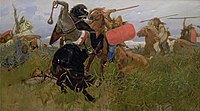Smerd
This article needs additional citations for verification. (January 2021) |
 |
| Knyaz (sovereign) |
| Boyar / Szlachta (noble) |
| Druzhinnik (retainer) |
| Smerd (free tenant) |
| Kholop (slave) |
A smerd (
disputed
]
In Kievan Rus', smerdy were peasants who gradually lost their freedom (partially or completely) and whose
slaves, they had their own property and had to pay fines for their delinquencies, legally the smerds never possessed full rights; killing of a smerd was punished by the same fine as killing of a kholop (similarly to a slave). The property of the deceased was inherited by the knyaz (prince). The Russkaya Pravda forbade torturing smerds during court examination without consent of the knyaz
.
During the 12th and the 13th centuries a number of sources mention the smerdy while narrating events in
proprietors, who possessed lands collectively (communes) or individually and had the right to freely alienate their own allotments. However, their personal freedom was limited: they were forbidden to seek a new master or princely patronage
. The knyaz could not accept complaints from smerds against their master. Also, smerds had to provide labor services and to pay tribute (dan') to the benefit of the city as a collective feudal master.
In Russia from the 14th century the word smerd as a denotation for peasants and other commonfolk was replaced with the word krestyanin (Mongol yoke.
The old word smerd continued to be used in the pejorative meaning, often in a situation when a lord spoke to dependent people or even lesser nobles. Also the word acquired a meaning of "one who stinks", with the related verb 'smerdet' (смердеть or śmierdzieć, to stink).disputed ]
See also
Notes
- ISBN 9780804706384.
- user-generated source]
External links
